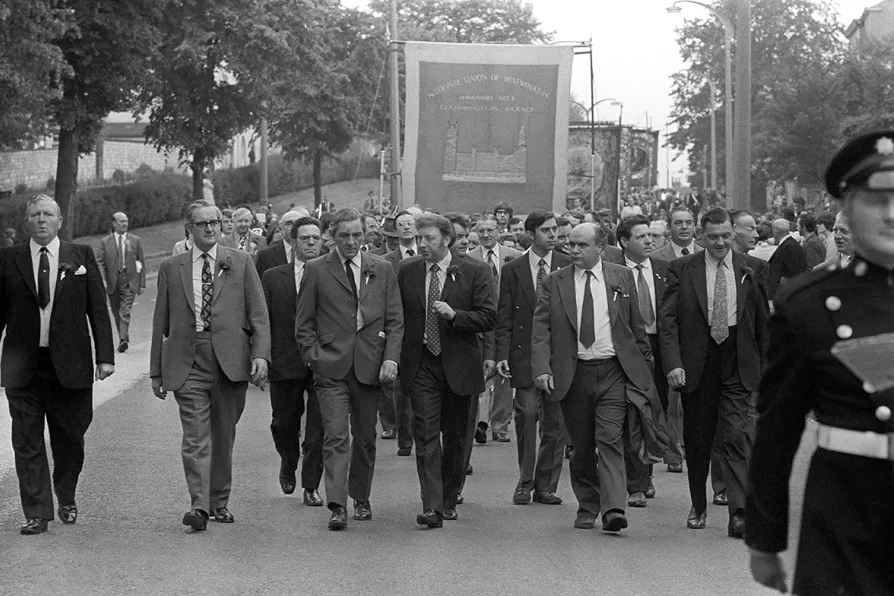As tens of thousands return to the streets for the first national Palestine march of 2026, this movement refuses to be sidelined or silenced, says PETER LEARY

 Len Murray (left) TUC General secretary: Arthur Scargill (centre) Yorkshire NUM president, and Lawrence, NUM, leading the parade at the Yorkshire Miners Rally. Mr Murray who spoke at the miners gala, called for unity among the unions, June 1974
Len Murray (left) TUC General secretary: Arthur Scargill (centre) Yorkshire NUM president, and Lawrence, NUM, leading the parade at the Yorkshire Miners Rally. Mr Murray who spoke at the miners gala, called for unity among the unions, June 1974
BRITAIN in 2024 is a country beset by conflict and turmoil. The Tories are split into ever more right-wing factions. Strikes on the cost-of-living crisis — made worse by the Truss legacy and its impact on rents and mortgages — continue, and a recession has been declared.
Meanwhile Labour, instead of seizing the moment, is backtracking on green investment policies and focused on navel-gazing on how mild any criticism of Israel’s genocide in Gaza should be.
This, however, is not the new normal: it is normal. Capitalism is not a system of stability and prosperity. Rather, it is based on perpetual crisis around a boom, slump cycle.
Just over 50 years ago during the Christmas of 1973, a Tory minister, John Davies, wished his family a happy Christmas and urged them to enjoy it as it might be their last.
It didn’t come to that, but it underlined that the Tories realised their society was built on shifting sands.
A miners’ overtime ban had started on November 12 1973 and a full-scale strike was underway by mid-February. Coal was then central to producing power. A three-day week in industry and rolling power cuts had been started by Edward Heath on December 31 1973, and 885,000 workers signed on as unemployed for two days a week. The three-day week and power cuts did not end until early March 1974.
The strike was settled after an election at the end of February 1974 with the ejection of Heath’s Tory government and its replacement by a minority Labour administration. Heath had called the election on the question of whether he or the trade unions governed the country. The electorate responded by ejecting the Tories from office.
The Tories blamed the impact of the miners’ overtime ban, but even evidence available at the time suggested this was unlikely to be true. The miners’ action had its effect, but in reality, coal was still reaching power stations and oil-fired stations were unaffected.
As we know with the benefit of hindsight, the Tories were already developing an obsession with the miners that was to lead the 1984-5 strike.
The wider concern was the crisis in oil supplies and the huge increase in their cost. The price hike was sufficient to provoke an economic crisis, which led to the subsequent Labour government taking a loan from the IMF in 1976 and ushering in the era of cuts in public spending that we have been in ever since.
The oil crisis had been immediately sparked by the 1973 war between Israel and Egypt. Egypt lost and one result was that oil supplies were reduced and prices increased by Arab oil countries.
The post-1945 era of cheap energy was over as was the economic boom based on it. Without question, John Davies grasped this as did, based on his diaries at the time, Tony Benn, who was the shadow minister responsible.
The entries in Benn’s diary for December 1973 and early 1974 are well worth reviewing. There was a palpable and mounting sense of crisis with a real feeling that the capitalist system itself was in question.
It is not a version of contemporary history that you are likely to easily stumble across; a populist TV historian such as Dominic Sandbrook won’t suggest that one lesson of the study of recent history is that the foundations of modern capitalism are built on sand.
Moreover, there is now at least one generation active on the left that is probably for the most part unaware that within living memory a group of workers, the miners, could challenge the government and, in effect, bring it down.
It can of course be done again — although not by the miners.
Keith Flett is a socialist historian. Follow him on X @kmflett.

It’s not just the Starmer regime: the workers of Britain have always faced legal affronts on their right to assemble and dissent, and the Labour Party especially has meddled with our freedoms from its earliest days, writes KEITH FLETT

Who you ask and how you ask matter, as does why you are asking — the history of opinion polls shows they are as much about creating opinions as they are about recording them, writes socialist historian KEITH FLETT












